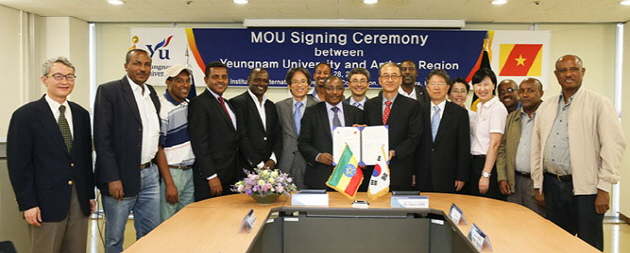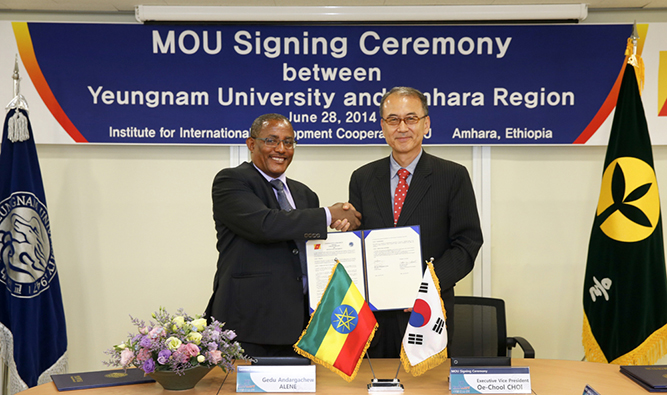'Saemaul Undong Handover' Begins in Ethiopia! N
No.88690- Writer YU
- Date : 2014.07.07 16:10
- Views : 10310
MOU signed on 28th to share 'Saemaul Undong and Rural Development for Ethiopia'
Hand over Saemaul Undong by YU on 2 sessions with the governor of Amhara in Ethiopia
Foster Saemaul leaders for global co-prosperity and achieve global social contribution activity achievements
[June 29, 2014]
Hand over Saemaul Undong by YU on 2 sessions with the governor of Amhara in Ethiopia
Foster Saemaul leaders for global co-prosperity and achieve global social contribution activity achievements
[June 29, 2014]

YU (President Noh Seok-kyun) will begin full-fledged spreading of the Saemaul Undong and Saemaul spirit in Ethiopia.
At the 19th floor of the YU Central Library on the 28th, the YU International Development Cooperation Center (Director Choi Oe Chool) and the governor of Amhara signed an MOU to establish Saemaul Undong in Ethiopa and to cooperate in rural development. This MOU was made through the request of Ethiopian Amhara Governor Gedu Andaregachew Alene (50) who visited YU to develop Ethiopia's rural level, which is still at the level of the 1960s in Korea, like that of current Korea. He came to learn the countless trial-and-errors and knowhow compiled while overcoming many difficulties during the course of Korea's Saemaul Undong, rural development policies and development processes.
With this agreement, YU share the university's capacities such as technical business support for agricultural education and rural development, research and education program support to share the Saemaul Undong and economic development experience, consulting for establishing Saemaul college, and cooperation for the global Saemaul forum. Amhara Province of Ethiopia agreed to provide full cooperation from the provincial government so that the 'Ethiopia Saemaul Undong' can take root.
Governor Alene's delegation visited YU to learn the Saemaul Undong from the 20th to the 29th. This agreement, which was carried out together with the training completion ceremony, is the will of Ethiopia to be continuously handed down the experience and knowledge of the Saemaul Undong, Saemaul spirit and rural development from YU, rather than making their visit to YU just a one-time event.
Prior to Governor Alene's visit, high ranking public officials including Alemnew Mekonnen Wolde (42), of the Central Committee of the Ethiopian ruling party visited YU as the first Saemaul training team from June 8 to 18, and the first team also requested cooperation from YU. The delegation from Ethiopia learned Korea's knowhow in various fields of rural development such as the history and achievements of the Saemaul Undong, economical development through the Saemaul Undong, Saemaul Undong and rural development, agricultural technology development, and finding income outside of agriculture. The delegations also had field trips to various research institutes and industrial complexes such as the Gyeongsangbuk-do Agricultural Research & Extension Services, Yeongcheon Agricultural Technology & Extension Center, Samsung Electronics, and POSCO. Furthermore, they visited grape and cattle farms, the Cheongdo Saemaul Undong Memorial Hall, and the Pohang Sabang Memorial Park to see for their selves the traces of the Saemaul Undong and the success cases of forestation projects pursued by the Korean government in the 1970s.
 Goveror Alene said, "I was surprised seeing the achievements of the Saemaul Undong and the development of Korea during my training period," and added, "I will do my best to take what I learned here and apply them to Amhara, so I ask that YU to continuously share their knowledge and experiences with us."
Goveror Alene said, "I was surprised seeing the achievements of the Saemaul Undong and the development of Korea during my training period," and added, "I will do my best to take what I learned here and apply them to Amhara, so I ask that YU to continuously share their knowledge and experiences with us." In response, YU International Development Cooperation Center director Choi Oe Chool said, "If the past 50 years was a time of opportunity for Korea, the next 50 years will be a very important time for our two countries, especially for Ahmara and YU." He added, "Since we have seen the intent to learn and practice the Saemaul Undong by the Ahmara provincial government of Ethiopia through their two visits to learn Saemaul and our MOU, we will do our best to help Saemaul Undong to take root in Ethiopia and contribute to the development of not only Ahmara through rural development, but also for the development of YU."